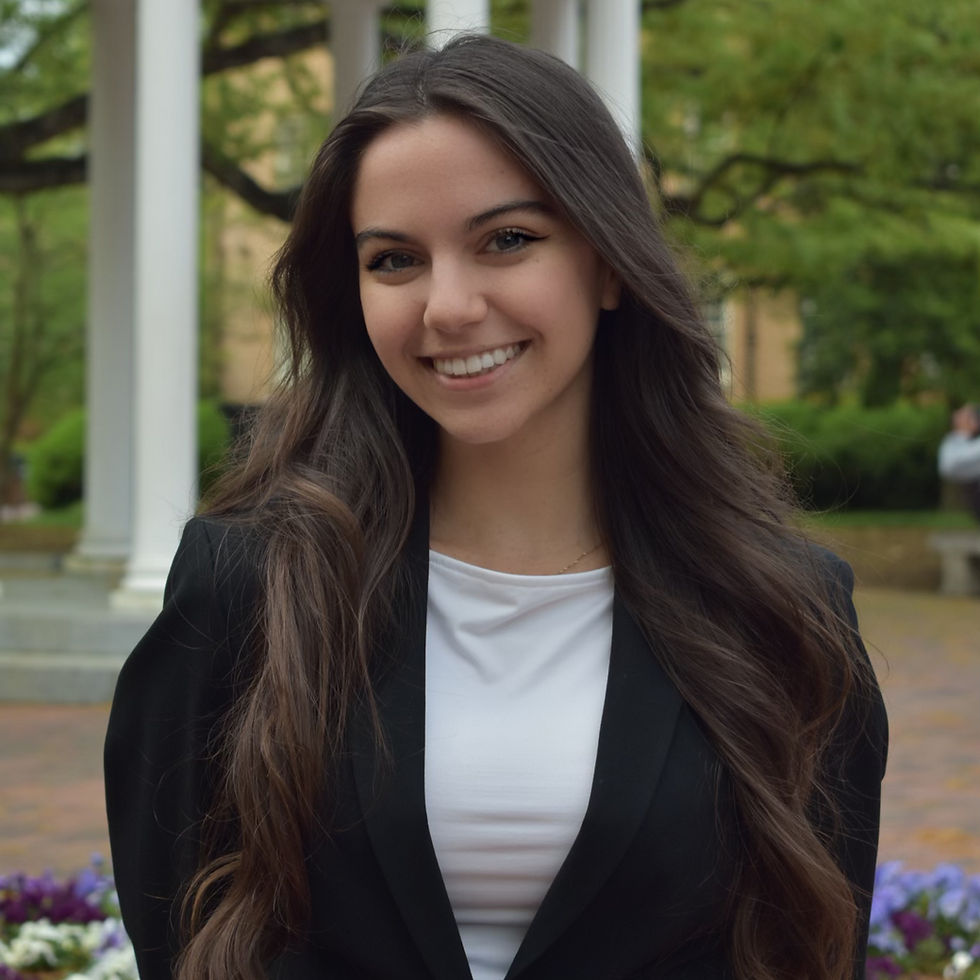Improving Retention Rates of Mentors for Substance-Affected Youth through Self-Determination Theory at iRT - with Sarah Soson
- gilinternship
- Feb 25
- 4 min read

Hi! My name is Sarah Soson, and I am a junior majoring in psychology and political science. Junior year of high school, my eager, bright-eyed self enrolled in AP Psychology, excited about the prospect of understanding the human mind. However, AP Psychology rapidly proved to be my least favorite course, consisting solely of memorizing authors, definitions, and theories. That year, I swore I would never take another psychology class again. Then, everything changed during my first semester at UNC Chapel Hill when I enrolled in my Triple-I course, “How To Not Be Fooled,” with Dr. Steven Buzinski. This course incorporated a social psychology component which focused on the social determinants of behavior, completely renewing my perception of the discipline, and I discovered a newfound passion for human behavior, motivation, and decision-making. The semester after that, I promptly declared a Psychology major and have not looked back since.
Inspired by Dr. Buzinski’s social psychology lectures, I joined his Social & Decision Science Lab, where I am now a research assistant and project lead actively studying Self-Determination Theory (SDT) as it relates to academic and health-oriented behaviors. SDT argues that the innate human desire to have freedom drives our motivation and behavior. In other words, our need for competence (mastery), relatedness (connectedness), and autonomy (independence) significantly impacts our decision-making abilities. As a research assistant, I am studying how restricting or expanding participants’ perceived freedom can impact engagement in mental health behaviors. This experience has introduced me to applied psychology, experimental design, and data collection as well as enhanced my interest in social behavioral research.
Yet, I continue to explore broader implications for SDT: Through the Gil Internship program, I am currently working as a Research Assistant for innovation Research & Training (iRT), an applied behavioral science research company. iRT develops evidence-based programs to enhance the quality of life, health, and mental health of communities using modern clinical knowledge and technical skills. As a Research Assistant, I am helping incorporate SDT into training programs for mentors of substance-affected youth under the guidance of Dr. Katie Stump and Dr. Janis Kupersmidt.
Mentoring is defined as a non-professional relationship developed between a mentor (older, experienced individual) and a mentee (younger individual) that aims to benefit the mentee’s socio-emotional skills, academic performance, or other aspect of their development. Overall, mentoring has proven effective in increasing positive health outcomes, particularly diminishing the likelihood of engaging in substance abuse. Thus, many organizations nationwide, such as Big Brothers Big Sisters, have developed mentoring programs with the goal of curbing the opioid epidemic.
In a 1998 study of Big Brothers Big Sisters programs, results demonstrated that youths mentees were significantly less likely to employ illegal substances, engage in violence, or skip school. However, while mentoring can generate positive outcomes, prematurely closed mentoring relationships can have severe consequences on the wellbeing of mentees. Overall, research estimates that approximately one half of mentoring relationships end prematurely, and although little is known about the causes of termination, mentors of substance-affected youth have a higher likelihood of prematurely ending mentoring relationships. Therefore, iRT’s Substance of Change Training is meant to provide mentors with the knowledge, skills, and resources to maintain and uphold mentees throughout the duration of their commitment. Incorporating SDT into this training can help increase mentor retention as well as bolster the overall efficacy. Thus far, my experience at iRT has been extremely rewarding: In addition to conducting applied research, I have gained a new outlook on social, developmental, and clinical psychology. As the semester continues, I hope to continue expanding my understanding of SDT while collaborating on innovative projects that merge theory with real-world applications.
My interest in curbing substance abuse and promoting mental health spans all aspects of my college career. As a psychology and political science double major, I am deeply invested in the intersection of policy and mental health. In 2021, Surgeon General Vivek Murthy issued an advisory, calling the unprecedented decline in youth mental health a crisis. Murthy specifically called for the passage of bipartisan legislation increasing the accessibility of mental health resources nationwide. However, while data reveals that both Democrats and Republicans believe mental health is a national issue, they struggle to find common ground in identifying solutions. As a political science scholar, I hope to increase communication across the aisle to address the ongoing mental health epidemic and promote the wellbeing of communities.
In just a few months, I will be applying to law schools throughout the country. I’m still unsure of the type of law I want to practice, but I know that one way or another, psychology will influence me, whether it be analyzing jury biases, faulty eyewitness testimony, or mob mentality behavior. My experience studying and applying psychology has made it clear that understanding the human mind is crucial to effectively practice the law. While I’m currently focusing on obtaining my J.D., I aspire to also pursue a Ph.D. in social psychology, work as an attorney, and teach the critical intersection of law and psychology.
As the semester continues, I look forward to expanding my research skillset and professional experience at iRT. I am thankful for my mentor, Dr. Katie Stump, for her guidance as I navigate the world of research outside of academia. I am also deeply grateful to Dr. Steven Buzinski and Emily Dolegowski for their ongoing support both inside and outside of the classroom. Finally, I want to express my deepest gratitude for the opportunity to be part of the Gil Internship and to be a member of this incredible cohort.



Comments